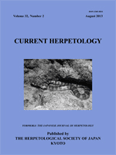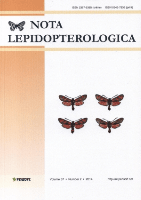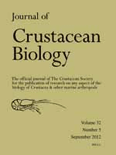
CURRENT HERPETOLOGY
metrics 2024
Innovating conservation and ecology for reptiles and amphibians.
Introduction
CURRENT HERPETOLOGY is a leading journal dedicated to the study of reptiles and amphibians, published by the Herpetological Society of Japan in collaboration with the Graduate School of Science at Kyoto University. With its ISSN 1345-5834 and E-ISSN 1881-1019, this journal serves as a vital platform for sharing significant research findings in the field of herpetology. The journal has been continuously contributing to the scientific community since its inception in 2000, with a scope that embraces diverse topics including ecology, behavior, conservation, and physiology of herpetofauna. Recognized for its scholarly impact, CURRENT HERPETOLOGY holds a commendable position within the Q3 quartile in the Animal Science and Zoology category, ranking 350 out of 490 according to Scopus metrics. Although it is not currently an open-access journal, it caters to an audience comprising researchers, professionals, and students looking to deepen their understanding and engage with cutting-edge studies. Based in Japan, at the Department of Zoology in Kyoto, this journal is poised to foster advancements in herpetological research and promote global collaboration in this vital area of science.
Metrics 2024
 0.27
0.27 0.60
0.60 0.50
0.50 20
20Metrics History
Rank 2024
Scopus
IF (Web Of Science)
JCI (Web Of Science)
Quartile History
Similar Journals

Hacquetia
Empowering Ecological Research with Open AccessHacquetia is an esteemed open-access journal dedicated to the interdisciplinary exploration of ecology, evolution, behavior, systematics, forestry, and plant science. Published by SCIENTO since 2007, this journal has established itself as a pivotal platform for researchers and academics looking to disseminate their findings in these critical fields. Nestled in the heart of Warsaw, Poland, Hacquetia offers unrestricted access to its content, promoting knowledge sharing among professionals, students, and enthusiasts alike. The journal, while ranked in the Q4 category across its relevant disciplines in 2023, serves as a valuable resource for those seeking to contribute to and engage with contemporary ecological and botanical research. Its commitment to open access ensures that cutting-edge research is available to a global audience, fostering innovation and collaboration in the scientific community.

ANIMAL BIOLOGY
Fostering Understanding of Life Sciences through Open AccessANIMAL BIOLOGY is a distinguished journal published by BRILL, focusing on the dynamic fields of Animal Science and Zoology, as well as Ecology, Evolution, Behavior, and Systematics. With an ISSN of 1570-7555 and an E-ISSN of 1570-7563, this quarterly journal serves as a pivotal platform for researchers and professionals seeking to contribute to the understanding of animal biology across diverse ecological contexts. The journal is recognized with a 2023 Scopus ranking of #234 out of 490 in the Animal Science and Zoology category, placing it within the 52nd percentile, alongside a rank of #409 out of 721 in Ecology, marking a solid contribution to the field. Although it currently holds a Q3 quartile in both categories, its commitment to quality research and novel insights continues to bolster its significance within the academic community. The open access option coupled with its publication history from 2003 to 2024 ensures a wide dissemination of knowledge, drawing in a global audience of researchers, professionals, and students eager to explore the intricacies of animal biology. By promoting high-quality discussions and innovative studies, ANIMAL BIOLOGY plays an essential role in advancing the understanding of life sciences and the evolution of biodiversity.

ACTA ZOOLOGICA BULGARICA
Connecting Researchers to the Pulse of ZoologyACTA ZOOLOGICA BULGARICA is a prominent academic journal dedicated to advancing knowledge in the fields of Animal Science, Zoology, Aquatic Science, Ecology, Evolution, Behavior, and Systematics. Published by the Institute of Zoology, Bulgarian Academy of Sciences, this journal serves as an invaluable platform for researchers, professionals, and students to disseminate their findings and engage with contemporary issues in biodiversity and ecology. With an established history since its convergence in 2010 and an ongoing publication schedule through to 2024, the journal holds a Q4 category ranking in multiple disciplines, highlighting its role in fostering scholarly communication in these areas despite its recent entry into Scopus-indexed rankings. Although currently not an open-access journal, ACTA ZOOLOGICA BULGARICA remains a key resource for those interested in the latest research and developments, particularly within the ecological and zoological landscapes of Europe and beyond.

NOTA LEPIDOPTEROLOGICA
Fostering global collaboration in biodiversity research.NOTA LEPIDOPTEROLOGICA, an esteemed journal published by Pensoft Publishers, has been a cornerstone in the fields of Insect Science, Animal Science, Ecology, and Evolution since its inception in 1995, with a commitment to open access publication since 2014. Based in Sofia, Bulgaria, this journal serves as a vital platform for researchers and professionals alike, facilitating the dissemination of significant findings related to Lepidoptera and broader ecological interactions. With an impressive scope covering vital aspects of biodiversity and taxonomy, NOTA LEPIDOPTEROLOGICA holds a Q3 ranking in its categories according to the 2023 metrics and plays a crucial role in advancing our understanding of insect science. By fostering international collaboration among scholars, the journal not only emphasizes the ecological importance of Lepidoptera but also contributes to global conservation efforts, making it an indispensable resource for students and experienced researchers aiming to deepen their knowledge in these fields.

JOURNAL OF CRUSTACEAN BIOLOGY
Pioneering Studies in Crustacean ConservationJOURNAL OF CRUSTACEAN BIOLOGY, published by Oxford University Press, is a premier peer-reviewed journal dedicated to advancing the field of crustacean biology. With an ISSN of 0278-0372 and E-ISSN 1937-240X, this esteemed journal has been a critical platform for the dissemination of research since its inception in 1984, encompassing a diverse array of studies related to the biology, ecology, and conservation of crustaceans. As part of the Aquatic Science category, the journal ranks in the Q3 quartile, illustrating its increasing relevance and impact within the scientific community. Although it is not an open-access journal, the quality of content published here ensures that it is highly regarded among researchers, professionals, and students alike. With annual converged issues until 2024, the JOURNAL OF CRUSTACEAN BIOLOGY remains a vital resource for those interested in crustacean research and its implications for broader ecological studies.

ANNALES ZOOLOGICI FENNICI
Fostering Insights in Ecology and EvolutionANNALES ZOOLOGICI FENNICI, published by the Finnish Zoological Botanical Publishing Board, is a prominent scientific journal dedicated to advancing the fields of Animal Science, Zoology, Ecology, Evolution, Behavior, and Systematics. Based in Finland and serving an international audience, this journal has been an essential resource since its inception in 1974, offering valuable insights into biodiversity, conservation, and ecological dynamics. While it holds a respectable Q3 quartile ranking across several relevant categories in 2023, its impactful contributions to the scientific community continue to promote critical discussions and foster research collaborations. Although the journal is not currently open access, its robust indexing in Scopus and recognition within the academic community underscore its significance. As a researcher, professional, or student, engaging with the ANNALES ZOOLOGICI FENNICI not only enriches your knowledge but also aligns you with the forefront of zoological research and conservation studies.

RUSSIAN JOURNAL OF HERPETOLOGY
Illuminating the Evolutionary Pathways of Reptiles and AmphibiansRUSSIAN JOURNAL OF HERPETOLOGY is a prominent scholarly publication dedicated to the field of herpetology, focusing on the study of reptiles and amphibians. Published by FOLIUM PUBL CO in the Russian Federation, this journal aims to foster the exchange of knowledge and research in animal science, ecology, evolution, and behavior. With its ISSN 1026-2296 and a significant commitment to high-quality academic discourse, the journal maintains a respectable standing within the Q3 quartile in both Animal Science and Zoology, as well as in Ecology, Evolution, Behavior, and Systematics. This attributes to its Scopus rank among leading journals in related fields, enhancing its visibility and influence. Spanning from 2014 through 2024, it publishes rigorous research that explores the diversity, biology, and conservation of herpetofauna, making it a vital resource for researchers, professionals, and students alike who are invested in the ecological and evolutionary dynamics of these species.

ZHURNAL OBSHCHEI BIOLOGII
Advancing Research in Ecology and EvolutionZHURNAL OBSHCHEI BIOLOGII, published by MEZHDUNARODNAYA KNIGA in the Russian Federation, is a venerable journal with a rich history originating in 1945. Renowned for its contributions to the fields of Ecology, Evolution, Behavior, and Systematics, as well as Medicine (miscellaneous), this journal provides a platform for researchers and professionals to disseminate significant findings within these domains. Although currently not classified as an open access publication, ZHURNAL OBSHCHEI BIOLOGII holds a Q4 quartile designation in its respective categories, reflecting its unique positioning within the global research landscape. While its coverage in Scopus is limited, the journal remains an important resource for academics interested in the evolution of biological sciences, especially within the context of Russian research traditions. By fostering scholarly communication and collaboration, ZHURNAL OBSHCHEI BIOLOGII continues to play a critical role in advancing knowledge in the biological sciences.

JOURNAL OF CONCHOLOGY
Pioneering Insights into Taxonomy and EcologyJOURNAL OF CONCHOLOGY, published by the Conchological Society of Great Britain & Ireland, is a prominent academic journal focused on the study of mollusks, specifically their taxonomy, ecology, and evolutionary biology. Through its rigorous peer-review process, it aims to provide a platform for significant research in the field, fostering deeper understanding and appreciation of these diverse organisms. Although it is not currently an Open Access journal, its publications contribute notably to the fields of Agricultural and Biological Sciences, notably in Ecology, Evolution, Behavior and Systematics and Aquatic Science, as indicated by its rankings in Scopus. The journal's archives trace comprehensive coverage from 1981 to 1990 and from 1996 to 2018. With its commitment to advancing conchological knowledge, the JOURNAL OF CONCHOLOGY serves as a crucial resource for researchers, professionals, and students invested in the biological and ecological dimensions of mollusk studies.

AMPHIBIA-REPTILIA
Advancing Knowledge in Amphibian and Reptile ResearchAMPHIBIA-REPTILIA, published by BRILL, stands as a prominent journal in the field of zoology and ecology, specializing in herpetology, the study of amphibians and reptiles. With a rich history since its inception in 1980, this journal aims to disseminate high-quality, peer-reviewed research that advances our understanding of these vital vertebrate groups. Holding a commendable 2023 Q2 ranking in both Animal Science and Zoology and Ecology, Evolution, Behavior and Systematics, it is recognized for its contributions to the scientific community. Researchers are encouraged to submit their manuscripts, benefiting from the journal's commitment to academic excellence, which is showcased in its operational transparency and rigorous editorial process. Though currently not open access, the journal's findings are pivotal for advancing conservation efforts and ecological studies, making it an essential resource for scholars, professionals, and students invested in these important fields.